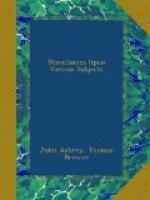i. e. Moreover the frequent presence of the Gods themselves, as I have above mentioned, plainly manifest, that they preside, with their good advice, as guardians, not only over cities, but particular men. This may be likewise certainly understood by the several significations of future events, which are predicted to men both sleeping and waking —– there was never any one single great man, but what has, in some measure, partaken of this divine inspiration.
“Testor Deum me olim ante plures menses melancolia ex adverso casu conceptam, Domini patris mei praesentisse, ac pronunciasse mortem, cum tamen ipso valde incolumi, nulla ejus mihi ratio probabilis afferretur: & sic ipse postea momentum sui obitus, septem circiter horas antea pronunciavit”.
i. e. I call God to witness, that formerly some months before, having conceived it in a fit of melancholy, from an unlucky event, that I foreknew, and foretold my father’s death, when he being quite in health, no probable account of it offered itself to me: and in like manner he himself afterwards pronounced the moment of his departure near seven hours before. “Imperialis Musaeum Physicum”. 104.
Oliver Cromwell had certainly this afflatus. One that I knew, that was at the battle of Dunbar, told me that Oliver was carried on with a divine impulse; he did laugh so excessively as if he had been drunk; his eyes sparkled with spirits. He obtained a great victory; but the action was said to be contrary to human prudence. The same fit of laughter seized Oliver Cromwell, just before the battle of Naseby; as a kinsman of mine, and a great favourite of his, Colonel J. P. then present, testified. Cardinal Mazarine said, that he was a lucky fool.
In one of the great fields at Warminster in Wiltshire, in the harvest, at the very time of the fight at Bosworth field, between King Eichard III. and Henry VII. there was one of the parish took two sheaves, crying (with some intervals) now for Richard, now for Henry; at last lets fall the sheaf that did represent Richard; and cried, now for King Henry, Richard is slain. This action did agree with the very time, day and hour. When I was a schoolboy I have heard this confidently delivered by tradition by some old men of our country.
Monsieur de Scudery in his Poem, entituled “Rome Vaincue”, fancies an angel to be sent to Alaric, to impel him to overrun the Roman empire with his swarms of northern people. The like may be fancied upon all changes of government; when providence destines the ends, it orders the means.
By way of parallel to this, the Pope by the like instinct, being at Rome in the consistory, did speak of the engagement in the famous battle of Lepanto, and that the Christians were victors. The fight at sea being two hundred miles or more distant from them.
King Charles I. after he was condemned, did tell Colonel Tomlinson, that he believed, that the English monarchy was now at an end: about half an hour after, he told the Colonel, “that now he had assurance by a strong impulse “on his spirit, that his son should reign after him.”




